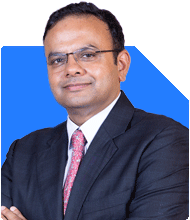Should I tweak my 10-year SIP portfolio with 15 funds?
Samraat Jadhav |2522 Answers |Ask -Follow
Stock Market Expert - Answered on Nov 11, 2024
He is a SEBI-registered investment and research analyst and has over 18 years of experience in managing high-end portfolios.
A management graduate from XLRI-Jamshedpur, Jadhav specialises in portfolio management, investment banking, financial planning, derivatives, equities and capital markets.... more

Hello Sir, I have started SIP in below funds recently ( all direct) for a period of 10 yrs. Please advise me on the quality of my portfolio i.e if needed to add or remove any of funds from my portfolio: SBI small cap - 5k Quant small cap - 10k Bandhan small cap - 10k Nippon indian small cap - 10k Invesco India small cap - 10k Motilal Oswal mid cap - 10k Motilal Oswal small cap - 5k Nippon indian growth - 5k Quant mid cap - 7k Icici blue chip - 5k Nippon india large cap - 5k Jm flexi cap - 8k Motilal Oswal bse index - 3k SBI psu mutual fund - 5k SBI contra mutual fund - 5k
You may like to see similar questions and answers below
Abhishek Dev | Answer |Ask -Follow
Financial Planner - Answered on Aug 05, 2023
Ramalingam Kalirajan |10924 Answers |Ask -Follow
Mutual Funds, Financial Planning Expert - Answered on May 18, 2024
Ramalingam Kalirajan |10924 Answers |Ask -Follow
Mutual Funds, Financial Planning Expert - Answered on Apr 27, 2024
Ramalingam Kalirajan |10924 Answers |Ask -Follow
Mutual Funds, Financial Planning Expert - Answered on May 25, 2024
Ramalingam Kalirajan |10924 Answers |Ask -Follow
Mutual Funds, Financial Planning Expert - Answered on May 28, 2024
Radheshyam Zanwar |6754 Answers |Ask -Follow
MHT-CET, IIT-JEE, NEET-UG Expert - Answered on Dec 23, 2025
Purshotam Lal |70 Answers |Ask -Follow
Financial Planner, MF and Insurance Expert - Answered on Dec 23, 2025
Purshotam Lal |70 Answers |Ask -Follow
Financial Planner, MF and Insurance Expert - Answered on Dec 23, 2025
Samraat Jadhav |2522 Answers |Ask -Follow
Stock Market Expert - Answered on Dec 23, 2025
Samraat Jadhav |2522 Answers |Ask -Follow
Stock Market Expert - Answered on Dec 23, 2025
Samraat Jadhav |2522 Answers |Ask -Follow
Stock Market Expert - Answered on Dec 23, 2025
Samraat Jadhav |2522 Answers |Ask -Follow
Stock Market Expert - Answered on Dec 23, 2025
Samraat Jadhav |2522 Answers |Ask -Follow
Stock Market Expert - Answered on Dec 23, 2025
Dr Nagarajan J S K |2578 Answers |Ask -Follow
NEET, Medical, Pharmacy Careers - Answered on Dec 23, 2025
Samraat Jadhav |2522 Answers |Ask -Follow
Stock Market Expert - Answered on Dec 23, 2025

























